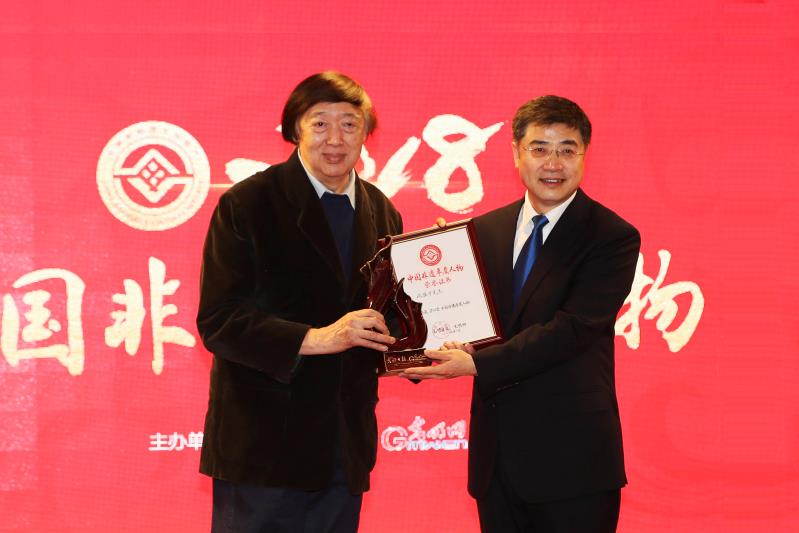Feng Jicai Selected as a 2018 Chinese Intangible Cultural Heritage Person of the Year

Professor Feng Jicai, celebrated writer, cultural scholar, and Director of Tianjin University’s Feng Jicai Institute of Literature and Art, was selected as one of 10 "Chinese Intangible Cultural Heritage Persons of the Year" in Beijing on January 13.
"For decades of persistence regardless of hardships, he has been engaged in intangible cultural heritage protection. He never stops, being devoted to perpetuating the roots of traditional culture. Over tens of thousands of miles, he struggled to preserve our cultural inheritance. It is incumbent upon him to repay the traditional culture’s nurturing grace.” At the award ceremony, editor-in-chief Zhang Zheng of Guangming Daily, announced that Professor Feng Jicai had been elected as a 2018 "Chinese Intangible Cultural Heritage Person of the Year".
After taking the trophy and certificate from editor-in-chief Zhang, Professor Feng talked about his love for Chinese Wood-block New Year Pictures, and the responsibilities of academia in preserving our intangible cultural heritage.
The day coincided with "Laba" festival on the eighth day of the twelfth lunar month. On every Laba festival, Professor Feng visits inheritors of intangible cultural heritage in various fields such as Yangliuqing New Year Picture. As Feng grew up in the tradition of celebrating beauty and culture of the new year since he was a child, he has developed a permanent love for the culture and traditional New Year pictures. He has a strong concern about the roots of Chinese culture especially when the impact of modernization and rapid development has alienated people from tradition. In his view, inheritors of intangible cultural heritage are our "relatives on culture" and naturally he wants to see them when Chinese New Year comes.
Over the years, Professor Feng Jicai and his teams have devoted themselves to the research and practice of the scientific protection of intangible cultural heritage and traditional villages and of oral history of inheritors. He said that in the era of the transformation from a farming civilization into an industrial civilization, the historical wealth created by the ancestors of the previous civilization stages must be passed down. At this time, the academic circles should stand on the front line of the protection and inheritance of the intangibles. There are a few things that we must do. First of all, we must make a place for the intangible cultural heritage. "In the past, intangible cultural heritage was life culture. There was no documentary record, like a traditional village with no history. Therefore, their first job is to write it down, so that the protection is based on science. This also helps the work of government for the country." Second, the academic community should stand at the forefront of culture, see new cultural trends in life as well as the problems encountered in inheritance, and pay attention to the inheritors. "Their difficulties are ours. Remember to help them understand their classics, inherit their craftsmanship and their regionality. " Third, they should also assume the role of appealing, spreading, and promoting the intangible cultural heritage to the whole society. "Let the people truly understand our culture, and be able to become conscious in the process of understanding. If people can consciously assume the inheritance of culture, cultural protection will not be a problem."
The selection of "Chinese Intangible Cultural Heritage Person of the Year" is guided by the Intangible Cultural Heritage Department of the Ministry of Culture and Tourism, organized by Guangming Daily and Guangming Online. It has been awarded for two consecutive years. The purpose is to sort out the iconic figures who have made outstanding contributions to the preservation and inheritance of intangible cultural heritage and the major events in the past year, and record the practice of intangible cultural heritage development.

